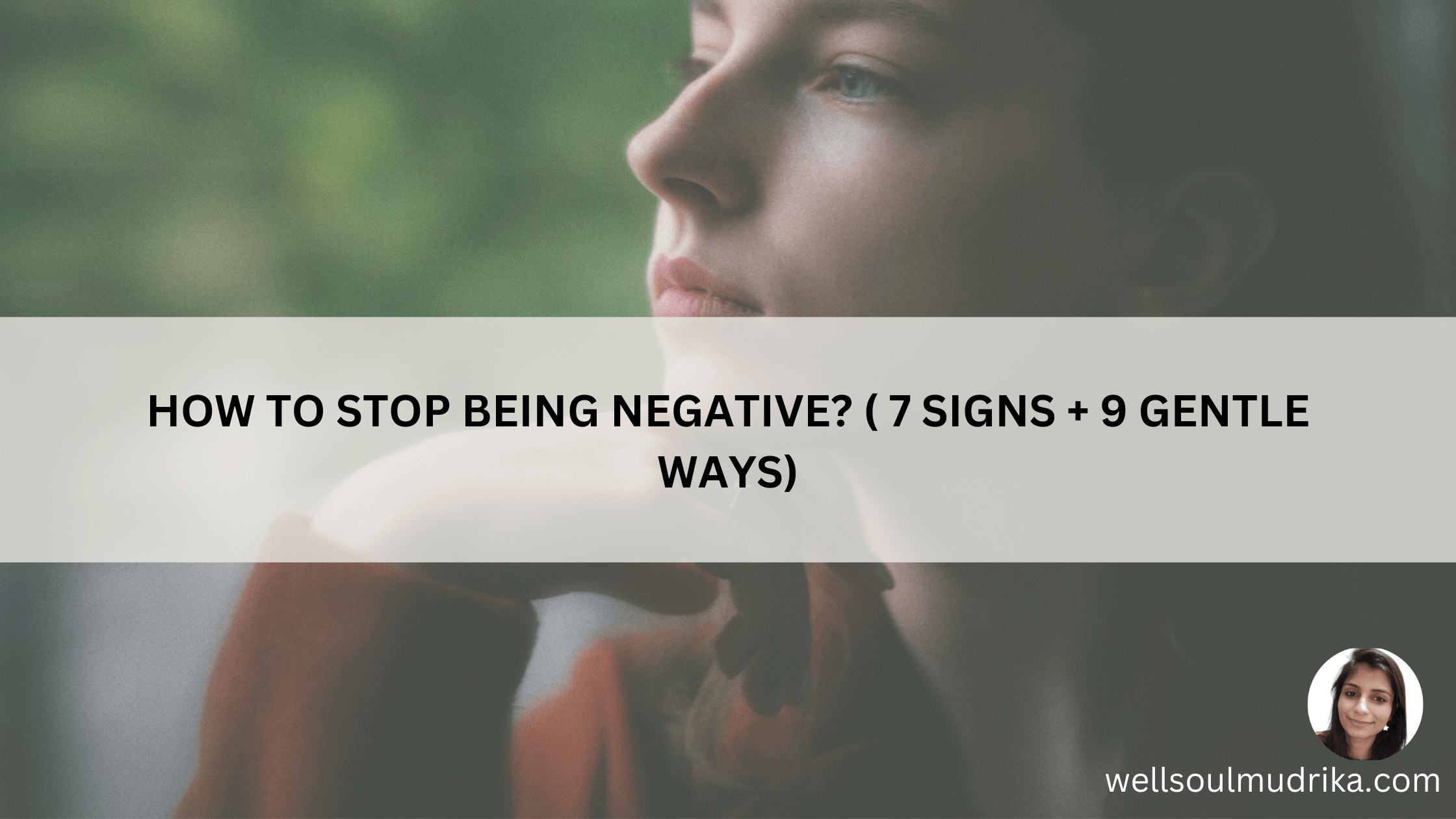Feeling stuck in a loop of negative thoughts? Learn how to stop being negative, spot the signs, and shift to a more positive, peaceful mindset.

Being positive won’t guarantee you’ll succeed, but being negative will guarantee you won’t.
– Jon Gordon
If you’re reading this, you probably know what it’s like to feel caught in a web of negative thoughts. I’ve been there too. Sometimes it felt like my mind was wired to expect the worst, even if nothing bad had happened.
A delayed text? “They’re ignoring me.” A missed opportunity? “I’m not good enough.”
A single thought can spiral into a storm of self-doubt or worry.
It’s easy to believe that everyone else has their mindset figured out, but the truth is, even the most positive people have their dark days.
What matters is learning how to stop being negative by noticing when negativity takes over, and gently guiding yourself back to a place of calm and clarity.
I’ve spent years untangling my own negative thoughts, and what I’ve learned is that the process is less about force and more about patience, self-compassion, and small daily shifts.
If you’re ready to step out of the cycle of negativity, read on to know why we get stuck in this loop, how to recognize it, and most importantly, how to stop being negative and turn things around without faking it.
Why Do We Become Negative?
Negativity can creep into our lives so quietly that we don’t even notice it until it’s affecting our work, our relationships, and our own sense of self-worth.
As someone who was a massive negative thinker, I know how hard it is.
Like any daily habit, negative thinking can become automatic. The more you engage in it, the more it becomes your default response. But, the good news is, it’s changeable.
According to neuroscientists, humans are wired with a negativity bias, meaning we naturally pay more attention to negative experiences than positive ones. It’s a survival mechanism.
Our surroundings also play a powerful role as emotions spread through social networks.
Also, as per the Physiological journal, chronic stress causes alterations in brain structure and function that can influence cognition, emotion, and behavior, which clearly explains why ongoing stress can make us more prone to negative thinking and emotional reactivity.
Well, understanding these roots is the first step in learning how to stop being negative and reclaiming a more balanced mindset.
7 Signs of a Negative Person ( Science-Backed )
Wondering how to stop being negative but not sure if it’s even a problem for you? Here are seven signs to watch for in your everyday life:
- You expect things to go wrong: You easily expect the worst outcomes, even when evidence is neutral or positive.
- You replay negative events: You can’t stop thinking about that awkward conversation… from 3 weeks ago.
- You self-sabotage opportunities: You doubt yourself and think, “Why bother? I’ll mess it up anyway.”
- You complain more than you celebrate: Instead of seeing your wins, you often focus on what’s wrong at work, at home, or in the world.
- You focus on problems, not solutions: You get stuck in “what’s wrong” rather than “what can I do?”
- You worry constantly: You keep thinking about what could go wrong, even in ordinary situations.
- You find it hard to trust others: You assume people have bad intentions.
Recognize yourself in any of these? No judgment. Being aware is the first step to change.
Common Causes of Negativity
Learning how to stop being negative and toxic means understanding that negativity often comes from specific areas of our lives. Some common causes include:
1. Workplace negativity: Deadlines, office politics, and lack of appreciation can lead to stress and pessimism. When I was working in an MNC, I often felt negative and stuck, which made me feel powerless and resentful.
2. Toxic relationships: Any relationship, be it a draining friendship, an unsupportive partner, or a judgmental family member, can lead to unresolved conflict, negativity, and lower your self-worth over time.
3. Low self-esteem
If you believe you’re not good enough, your mind will find ways to confirm it. This turns into a cycle of self-doubt, negative self-talk, and missed opportunities. And you feel undeserved.
Now that you know the causes of negativity, let’s get into how to stop being negative all the time.
How to Stop Being Negative: 9 Gentle Ways for a Fulfilling Life
Over time, I’ve learned to untangle my own negative thinking, and the steps that helped me get there were surprisingly simple. Here are nine tips on how to stop being negative, nurture your self-esteem, and quiet negative self-talk:
1. Challenge your negative thoughts with evidence
Learning how to stop being negative often starts with questioning your inner critic. Don’t accept every negative thought as fact.
Ask: Is this really true? I used to believe every harsh judgment until I realized they’re often just old stories, not reality.
Now, when I spiral, I pause and ask for evidence. If I think, “I always mess up,” I look for times I succeeded. The negative thought might be louder, but it’s rarely the whole truth.
So, the next time, try this: Notice the thought, ask for evidence, reframe with reality.
Practicing self-compassion and self-love habits is key. I try to talk to myself like a friend. The more I challenge those thoughts, the less power they have. It’s a daily practice, but it’s a powerful way to stop being negative.
2. Practice gratitude for yourself instead of complaining
Next on the list for how to stop being negative is swapping complaints for gratitude. I know it sounds simple, but it really works!
Whenever I catch myself about to complain, I pause and ask, “Okay, but what’s actually going right today?” It’s such a small shift, but it changes everything.
One thing that’s helped me a ton is keeping a super simple, one-line journal. Every night before bed, I write down just one thing that went well or made me happy that day.
Some days it’s big, but honestly, most days it’s something tiny, like a good coffee, a comforting movie, or a song. Over time, this habit has made me notice the good stuff so much more.

If you want to stop being negative and angry, try this:
- Keep a gratitude journal (even just a sentence a day!)
- Tell people you appreciate them.
- Reflect on what you like about yourself and your efforts
- When you’re tempted to complain, look for a solution instead
Trust me, the more you focus on what’s good, the less space negativity has to grow.
3. Use the “thought-stopping” technique
One trick I swear by for how to stop being negative is the “thought-stopping” technique.
Studies on cognitive behavioral therapy have shown that thought-stopping can reduce negative thinking and help people regain control over distressing thoughts, especially when combined with replacing the negative thought with a more positive or realistic one.
So, next time you catch yourself spiraling into a negative loop, literally say “stop!” out loud if you can, or just firmly in your mind. It might feel a bit silly at first, but it really does interrupt that cycle of overthinking and gives you a chance to reset and reframe.
Once you’ve paused the negativity in its tracks, try to gently shift your focus to something neutral or positive.
Sometimes I’ll take a deep breath, look around, or even think about something that makes me smile.
4. Practice self-care (daily)
Honestly, making self-care a daily habit is one of my favorite answers for how to stop being negative all the time.
Think of it as giving your mind a little reset button every day. ( Not sure where to start? Here are the 7 types of self-care you can try.)
I love starting my morning with a few quiet minutes, sometimes just stretching, meditating, and watching the sunrise.
Throughout the day, I sneak in tiny acts of kindness for myself, like eating something nourishing or listening to a song I love.
And at night, I wind down with a book. These small rituals don’t just boost my mood, they help me let go of stress and keep negativity at bay.
Try it, and you’ll notice how these moments become the best parts of your day.
5. Connect with nature
Let nature work its magic. There’s something about being outdoors, whether it’s a walk or just watching the clouds, flowers, or birds outside, that instantly quiets my racing thoughts. When I’m surrounded by greenery, my worries shrink and I feel lighter, like the fresh air is decluttering my mind.

Even a few minutes outside can make a huge difference. Next time negativity creeps in, step out, breathe deep, and let the natural world remind you that there’s so much more to life than your worries.
You might also like: How to Reconnect With Yourself When You Feel Lost: 11 Powerful Ways.
6. Practice mindfulness and meditation
If you’re searching for how to stop being negative, mindfulness and meditation are honestly life-changing tools.
Mindfulness helps you stay present, so you’re not stuck replaying old regrets or worrying about what’s next. Even a few minutes a day can make a real difference.
So, add short mindfulness exercises to your routine, use a guided meditation app, or just pause and notice your senses, the feeling of your breath, and the sounds around you.
These simple moments help ground you and quiet that inner negativity.
And it’s not just me saying this! Studies show that mindfulness can reduce rumination and negative thinking. On top of that, regular meditation is linked to lower stress and a more positive outlook.
7. Set healthy boundaries
One of the best ways I’ve learned how to stop being negative all the time is by setting healthy boundaries.
Saying no isn’t always easy. But setting boundaries helps you protect your time and emotional space, and that’s a true act of self-respect. When you don’t set limits, it’s easy to get drained by other people’s stress or get stuck in situations that bring you down.
Research on family dynamics shows that unclear or unhealthy boundaries, such as overprotection, emotional neglect, or role reversal, are linked to greater stress and poorer mental health outcomes in children and adults.
I used to overcommit and then feel exhausted and resentful. But once I started saying no to things that didn’t serve me, I noticed my mood improved, and negativity didn’t have the same hold on me.
Also read: How to Stop Seeking Validation From Others? 11 Tips to Live Your Best Life.
8. Always set realistic goals
If you want to know how to stop being negative, start by setting goals that are actually doable.
I used to set these huge, almost impossible expectations for myself, and when I couldn’t meet them, I’d spiral into negative self-talk. Now, I break my big dreams into smaller, bite-sized steps.
Every little win gives me a sense of accomplishment and keeps my mindset positive.
For example, instead of telling myself I need to “be active and fit,” I set a goal to take a 15-minute walk three times a week. When I stick to it, I feel proud and motivated to keep going. And, I even celebrate the tiniest victories.
It’s amazing how those small wins add up and help you build real confidence and make you avoid those negative thoughts.
9. Practice positive visualization
This one’s become a real game-changer for me in learning how to stop being negative all the time. I take a few quiet moments to close my eyes and picture myself succeeding, feeling confident, calm, and content.
I try to really feel those emotions, like I’m already living that moment.
Research shows that practicing positive visualization, vividly imagining yourself succeeding, boosts your mood, motivation, and even helps you perform better in real life.
It might feel a bit awkward at first, but trust me, your brain starts to believe what you imagine!
You might want to read: 10 Important Things To Quit To Simplify Your Life
Positive vs. Negative Self-Talk: Actionable Reframing
Changing your self-talk is one of the most powerful ways to shift your mindset, and it’s a key step in learning how to stop being negative. Here’s how you can reframe common negative thoughts:
| Negative Self-Talk | Positive Thinking (Reframe) |
| I always mess things up. | I’m learning and getting better with each try. |
| Nobody cares about what I have to say. | My voice matters, and I can share my thoughts. |
| I’m not as good as others. | Everyone has unique strengths, including me. |
| I can’t handle this stress. | I’ve overcome challenges before; I can do it again. |
| Things never go my way. | Setbacks are temporary, and good things will happen soon. |
Use these reframes whenever you notice negative self-talk. And, it will become your nature with time, just like mine.
If you liked reading so far, don’t forget to pin it for later.
How To Stop Being Negative and Make Way for a Positive You
Negativity is a natural part of being human, but it doesn’t have to control your life. By understanding why negativity happens, recognizing the signs, and learning how to stop being negative, you can break the cycle and build a more positive mindset.
You don’t have to fake it. Just be patient and try some strategies consistently to start living with more optimism and joy. Over time, you’ll notice your outlook shifting and your sense of self-worth growing.
Got anything you’d like to add? Share them below in the comment section.
FAQs
1. How do I stop a negative mindset?
When you are spiraling into negativity, pause and ask: “Is this true? Or just how I feel right now?”Just notice your thoughts without judgment and then reframe them. Instead of “I always mess up,” try “I’m still learning, and that’s okay.” These small shifts over time will help you build a positive mindset.
2. How do I stop being negative anymore?
Nobody becomes positive overnight. So, try to work with your mind and not against it.
Start by limiting toxic influences, practicing self-awareness, and taking action on things you can control. The goal isn’t to never feel negative again, but to not stay stuck in that space.
3. How do I handle negativity?
You can think of negativity like a cloud; it passes, but it shouldn’t decide your day.
Always ground yourself with facts and vent in healthy ways (like journaling or talking to a trusted friend), and remind yourself: “This is temporary.” And focus on what’s still good around you.



